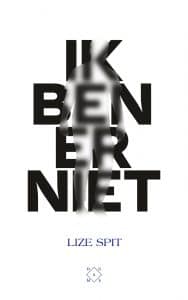De Belgische schrijfster Lize Spit (32) moest voor haar nieuwe roman Ik ben er niet niet alleen haar woorden en verhaallijnen temmen, maar ook de stemmen in haar hoofd. ‘Ik hoorde elke dag het stemmetje dat zei: “Je kunt het niet”.’
Weinig schrijvers maakten zo’n overdonderende entree in de literaire wereld als Lize Spit in 2016 met Het smelt. De roman werd een hit, won meerdere prijzen, verkocht uiteindelijk zo’n 200.000 exemplaren, kreeg 12 vertalingen, plus een toneel- en filmbewerking. Maar het overrompelende succes ten spijt, voelde Spit zich allesbehalve zelfverzekerd toen ze werkte aan haar tweede roman Ik ben er niet.
Het is een verhaal over de teloorgang van een relatie en het omgaan met psychische instabiliteit. De jonge vrouw Leo en haar vriend Simon, beiden rond de dertig, zijn elkaars jeugdliefde. Door het vroege verlies van hun moeder hebben ze allebei een kras op hun ziel, en bij elkaar vinden ze veiligheid en troost. Totdat Simon manisch-depressief wordt en in de greep raakt van angsten en wanen. Hun hele leven komt op de helling te staan. Ik ben er niet is opnieuw een dikke, psychologische pageturner die bijna de 600 pagina’s aantikt.

Grote druk
Hoe ging je aan je bureau zitten na het overweldigende succes van je debuut?
‘Het eerste jaar nadat Het smelt uitkwam, was ik voortdurend op pad voor interviews en optredens, ook in het buitenland. Op een gegeven moment móést ik tegen mezelf zeggen: nu ga ik me weer toeleggen op het schrijven. In interviews had ik gezegd dat de druk wel meeviel, maar toen ik eenmaal weer begon met schrijven, was het moeilijk. Ik heb een negatief zelfbeeld, en ik hoorde elke dag een stemmetje in mijn hoofd dat zei: “Je kunt het niet.” Ik heb veel druk ervaren.’
Is de lat nog hoger komen te liggen?
‘Eigenlijk wel. Dit boek moet beter zijn dan het eerste, anders heb ik het niet goed genoeg gedaan. Tegelijk weet ik dat het succes van Het smelt niet te overtreffen valt. Er zijn meer mensen die over mijn schouder meekijken en iets verwachten. De invloed van dat zelfbewustzijn heb ik onderschat. Ik kon de buitenwereld bijna niet meer wegdenken en was me zelfs bewust van de vragen die ik naderhand zou krijgen over het schrijfproces. Zo hield ik notities bij van de muziek die ik luisterde tijdens het schrijven, omdat ik die vraag veel had gekregen bij mijn eerste boek. Tot ik op een gegeven moment besefte: ik moet gewoon met mijn boek bezig zijn, niet met alles eromheen. De noodzaak om dit verhaal te vertellen was groot. Er zijn zoveel mensen die te maken krijgen met een naaste die psychisch ziek wordt – alleen al op de uitgeverij hoorde ik van twee mensen dat ze ook zoiets hadden meegemaakt in hun omgeving, en ook hoe moeilijk het al die jaren was geweest om erover te praten.’
Schrijven als sublimatie
Was het moeilijk je in te leven in dat psychologische proces waarbij iemand langzaam de draad kwijtraakt?
‘Schrijven is een vorm van sublimatie: met fictie probeer ik van een persoonlijk verdriet iets moois en nuttigs te maken. Ik heb dit zelf ook meegemaakt met een dierbare. Een manie begint met vrolijkheid die steeds extremere vormen aanneemt, en het is voor de familie of partner heel moeilijk te bepalen wanneer het gevaarlijk wordt en je moet gaan ingrijpen. Net als Leo wachtte ik heel lang af. Tot ik op den duur niet alleen van de ander vervreemdde, maar ook van mezelf.
De roman draait vooral om de ondermijnende invloed van een psychische ziekte op relaties met anderen, het onderlinge vertrouwen. Als iemand dingen doet die je nooit van diegene verwachtte, is het heel moeilijk om dat vertrouwen terug te vinden. Om erop te durven vertrouwen dat iemand weer oké en de situatie weer veilig is. Ook als het even goed gaat, denk je: maar straks gaat het weer fout, en zo kan het eigenlijk nooit meer écht goed gaan. Zo heb ik het zelf ook ervaren. Bij iemand die manisch is, zie je vrolijkheid meteen als de aankondiging van een ontsporing.’
Ontsporen
Je gebruikt een mooi beeld: de hoofdpersonen zijn als twee pilaren die tegen elkaar aanleunen en elkaar in evenwicht houden. Door de bipolaire stoornis stort het bouwwerk in.
‘Je geliefde voor je ogen zien ontsporen is het ergste wat er bestaat: het meest veilige wordt ineens het meest onveilige. Je kunt weken of maanden samenleven met iemand voordat duidelijk wordt dat diegene langzaam afglijdt in wanen. Veel mensen die het hebben meegemaakt, denken achteraf: had ik het maar eerder kunnen herkennen, dan had ik ook eerder hulp kunnen zoeken. Juist daarom heb ik de tijd genomen om dat hele proces te beschrijven.’
Hoop je een taboe te doorbreken?
‘Dat is niet het doel, wel een welkom neveneffect. Er heerst veel schaamte rondom geestesziekte, daarom wordt er zo weinig over gesproken. Een roman biedt misschien een opening voor gesprek – zoals dat ook gebeurde op de uitgeverij. Ik denk dat lezers zich in Leo of Simon kunnen herkennen en er iets aan kunnen hebben. Tegelijk lig ik nu al wakker van de recensies die gaan komen en voel ik me kwetsbaar en leeg. Zal mijn jarenlange werk beloond worden? Moet ik eigenlijk gewoon weer aan het werk omdat het niet goed genoeg is, of verdien ik het om nu uit te rusten?’
Ik ben er niet van Lize Spit is verschenen bij Das Mag, € 25,99
